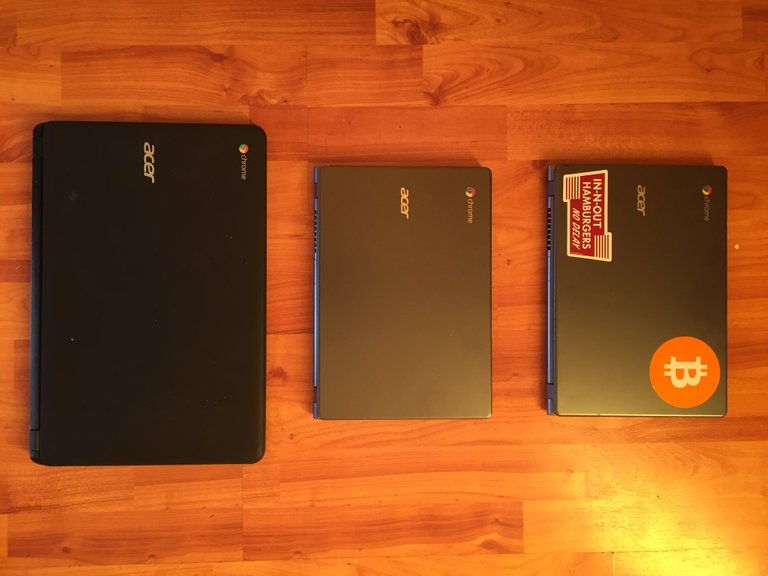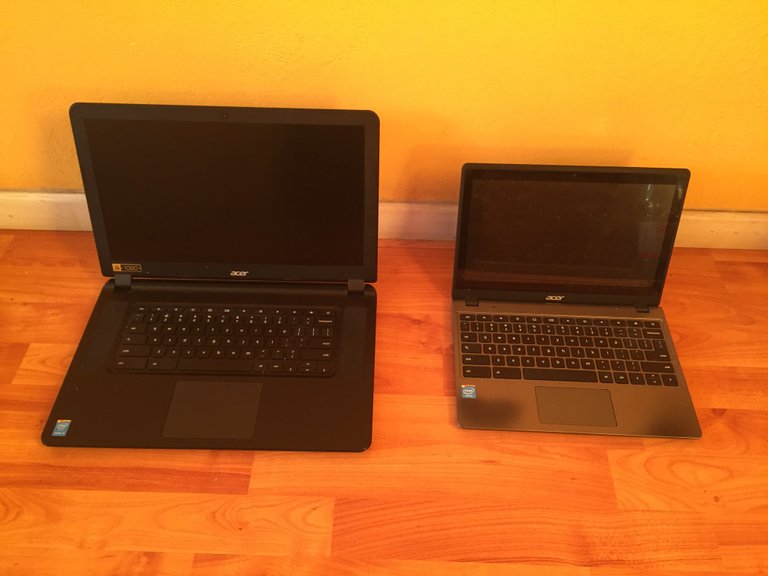Unlock the full potential of these value-priced laptops by installing Linux.
Let me explain why I'm running Linux on my third Acer Chromebook and loving it!

As a casual nerd with enough command-line skills to be dangerous to myself, I've tinkered with different Linux installs over the last decade, yet it never became my mainstay operating system. In the earliest days of my Linux experience, I remember it being a real headache, often requiring nuanced configuration changes that were beyond my skill set.
That all changed in 2013 when I installed Ubuntu to an Acer C720P I had purchased for work. That laptop quickly displaced the Windows machines in my life. I used it for everything. As soon as I found out that little Celeron CPU could run Civilization V, my beastly desktop gaming rig began to collect dust. Now that Intel has seriously stepped up its game with its 5XXX series integrated graphics and with Valve's efforts in Linux gaming, there are hundreds of games available through the Steam Store. My Linux laptop is now capable of serving all of my needs, something I never expected to say just a few years ago.
Civilization V running smoothly at 1920x1080 on Linux!
Why a Chromebook?
With the Chromebook, Google has sought to offer a streamlined (stripped-down?) browsing terminal which is capable of most everyday tasks, at a very competitive price. Because ChromeOS is included free, you save the cost of the licenses associated with Windows or Mac OS. Basically, with a Chromebook you get the hardware without the frills or bloatware.
Why Linux?
Linux is fast, efficient, open-source, and it doesn't spy on you. Chromebook laptops offer great hardware, but you need the power of Linux to unlock their full potential. With Linux, you can choose from a range of distributions suited to your needs. Personally, I've settled on Fedora, which has been incredibly stable and capable of everything I've needed from it. I won't promise you Linux can do everything you'll need and yes, people have plenty of uses for proprietary operating systems, but I confidently can say that a distro like Fedora can suit the majority of computer users' needs.
Acer Chromebooks
My experience has been entirely with Acer Chromebooks. From what I've found, they offer the best hardware for the best price. While Acer's laptops are aimed at the budget-conscious user, they 've designed some excellent hardware. With multiple available hardware configurations there are a range of models to meet different needs. As of the writing of this post, the Acer C910 is the fastest Chromebook available, with the exception of the Google Pixel.
A note on the Google Pixel: The Google Pixel offers better internal components and body, for a much higher price, but the 4:3 aspect screen is a no-go for me. If you require more CPU/RAM, there is a Pixel model with an Intel i7 model w/ 8gb.
Recommended Models
The below models are available with different hardware configurations. You can choose from Celeron, i3, or i5 CPU's and either 2gb or 4gb RAM. You can install Linux to most Chromebooks AFAIK, but be aware that there are some issues with ARM-based CPU's.
Tons of great use out of my first Chromebook on the right, notice the worn palm rests!
- Acer C910
My current machine. I love this computer and often marvel at the great value I get out of it. It has a beautiful 15" 1920x1080 screen and is pretty lightweight for its size. The Intel Broadwell i5 CPU can handle anything I throw at it, nothing ever feels sluggish, except when I hit the 4gb RAM bottleneck. Other than that, this computer has been fast and reliable.
- C720/C720P (Touchscreen Model)
The C720 series offers a well-built, very portable laptop. My first Acer Chromebook was the C720P, which was supposed to be mainly a work machine. I never used the touchscreen much, but I missed it when it when I opted against it with my second C720. This is one of the best value computers on the market once you've installed linux.
Getting started
Once you're ready to install Linux to your Chromebook, visit the Arch Linux wiki for an excellent step-by-step guide. The steps are pretty much the same regardless of which distro you're installing, although not all distros are well-suited for Chromebooks. Personally, I've tried Ubuntu, Lubuntu, Bodhi, Fedora, and Mint with success, though I've settled on Fedora due to its stability and overall performance.
Tips & Tricks
Most Acer Chromebooks come with either a 16gb or 32 gb SSD. I recommend 32gb as a minimum, though I got plenty of good use out of my 16gb C720P.
The SSD is pretty easily replaced if you need more local drive space. Instructions available on the Arch Linux Wiki. Alternatively, you can pop a low-profile USB 3.0 drive in the side for a cheap and easy storage upgrade!
The Arch Linux wiki contains optional instructions for disabling/enabling the hardware write-protect screws. If you are comfortable, I highly recommend taking these steps. I can say from experience that it might save you a lot of headache.
If you're new to Linux, try out a couple different distributions to see what you like! Linux offers so many great choices, with different flavors you to customize your machine to fit you needs!
Have fun and always make good backups!!!
Cool!
I didn't know you can install Linux on Chromebooks!
Aww yeah, and he's running the legendary Arch Linux.
You can also keep ChromeOS and just boot into Linux when you want to. Here's the guide I used back in Jan '14 to do it on my Acer C720 : http://lifehacker.com/how-to-install-linux-on-a-chromebook-and-unlock-its-ful-509039343
Yes, the chroot method can be a great option as well! Thanks for mentioning it! That was actually the first method I used to install Linux tot he C720P. Ultimately, I found myself spending most of my time in Linux, so I decided to save system resources and cut ChromeOS out of the equation. Definitely a good option though!
Cheers! This is great timing, was just talking about wanting to try this.
I have a friend who has been using Debian on Pixels for quite some time and is very happy with them - he recently got the aforementioned i7 Pixel and showed it to me the other day, and it's a beauty - really nice construction and some nice features like tapping the top for the battery indicator.
The only thing that turns me off the idea is the number of meta keys - the bottom row is suspiciously sparse, and I like to bind the hyper (Windows logo or Cmd key) to control a bunch of stuff in my window manager.
That said, I'd seriously consider one as my next laptop.
The Pixel seems like a really nice piece of hardware, especially considering what'd under the hood. Like I mentioned, the main reason I never got one is that I'm not interested in a 4:3 screen. If Google put out an i7 Pixel w/ a widescreen format monitor, I'd probably jump on it.
I have been looking into this but finally went with a Asus Zenbook (a bit more meet). Ditching windows and installing Arch. Love it.. But thanks anyway for sharing, let's hope more people will shift to Linux!! Greets (from my Zenbook)..
I agree that for people who are able to install Linux on a chrome book without help its a good idea, However for someone who does not want to fiddle with the computer often sticking with the default OS is the way to go. Power wash (basicly being able to undo any virus with the click of a button) is a great feature and there are many good chrome extensions and google services.